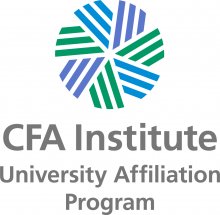
- Accounting and Finance
MSc — 2025 entry Accounting and Finance
Our Accounting and Finance masters is a practice-based course that will encourage you to embrace opportunities to engage with real business problems throughout your studies. You'll graduate with the skills needed to work in multinational corporations and be a successful decision-maker in an increasingly complex global financial environment.
Why choose
this course?
- As an accounting and business finance student, you’ll be based in the Surrey Business School and be part of a vibrant community, focused on improving business practice and creating a sustainable and positive change.
- The School is renowned for its:
- World-class teaching and research
- Strong focus on entrepreneurship and enterprise
- Vibrant and diverse community
- Excellent career prospects.
- This masters is recognised by the Chartered Financial Analyst Institute (CFA) and it you will be able to benefit from exam exemptions from several accountancy bodies, such as ACCA, CIMA and ICAEW.
Statistics
1st in UK for finance
Surrey Business School is ranked 1st in the UK for finance in the 2023 Postgraduate Taught Experience Survey (PTES) with an overall satisfaction score of 100% (CAH Group 3)
Fantastic graduate prospects
94% of our Surrey Business School postgraduate students go on to employment or further study (Graduate Outcomes 2024, HESA)
Top 10
Surrey is ranked 9th in the UK for overall satisfaction (Postgraduate Taught Experience Survey 2023)
Accreditation

Recognised by

What you will study
You’ll gain a solid understanding of main financial and management accounting systems and how they are applied in decision-making.
You’ll learn econometric techniques and take modules in the foundations of accounting and finance, equipping you with the skills and knowledge to thrive in today’s ever-changing global business environment.
The core modules of our Accounting and Finance MSc explore both industry-relevant theory and the quantitative techniques you’ll need to understand related literature and carry out empirical investigations.
Professional recognition
MSc - Association to Advance Collegiate Schools of Business (AACSB)
Accredited by the Association to Advance Collegiate Schools of Business (AACSB).
MSc - Chartered Financial Analyst Institute (CFA)
Recognised by the Chartered Financial Analyst Institute (CFA).
Exam exemptions from accountancy bodies
Graduates of the MSc Accounting and Finance course can apply for examination exemptions from several accountancy bodies, such as:
- ACCA (the Association of Chartered Certified Accountants)
- CIMA (the Chartered Institute of Management Accountants)
- ICAEW (the Institute of Chartered Accountants in England and Wales).
This can be done directly through the individual professional organisation’s website on successful completion of the course.
Entry-level exemptions for the ACCA and ACA accountancy professional bodies: when you complete this one-year course, you'll have the opportunity to apply for some exemptions from ACCA and ACA, giving you a head-start with the accreditation process.
Significant CIMA exemptions: on successful completion of your studies, you'll qualify for numerous exemptions from CIMA, the management accountancy chartered body.
Apply for CFA funding (one level exam)
If you’re interested in gaining the CFA (Chartered Financial Analyst) you'll have the chance to apply for a part-funded CFA scholarship.
Our course runs over three semesters. You'll take four modules in both Semester 1 (October to January) and Semester 2 (February to June). The summer semester runs from June to September. You’ll study two taught modules and carry out your independent project during this time.
The structure of our programmes follows clear educational aims that are tailored to each programme. These are all outlined in the programme specifications which include further details such as the learning outcomes:
Modules
Modules listed are indicative, reflecting the information available at the time of publication. Modules are subject to teaching availability, student demand and/or class size caps.
The University operates a credit framework for all taught programmes based on a 15-credit tariff, meaning all modules are comprised of multiples of 15 credits, up to a maximum of 120 credits.
Course options
Year 1
Semester 1
Compulsory
To provide a grounding in the principles of accounting for students at Master level, most of whom are intending to pursue a specialist career in accounting or finance.
View full module detailsThis module lays the statistical and econometric foundations for data analyses and modelling, covering fundamental topics of estimation and inferences of linear and non-linear econometric models using Excel/Stata software. The quantitative, analytical and software skills acquired from this module will directly enable students to conduct independent quantitative analysis of data using estimation as well as hypotheses testing. As such, the module aims to help students to learn research methods, an integral part of any research project at post-graduate level, market analysis or policy analysis in government and non-government organisations.
View full module detailsThe module offers a structured approach to the conceptual and practical principles of auditing. It provides a real-world perspective on current auditing practices with coverage of topical developments and issues.
View full module detailsThe role of the management accountant continues to evolve; and with advances in technology, demand for management accounting skills has been on the rise to support strategic decision-making in businesses. In this module, you will develop knowledge and skills that will enable you to apply specialist management accounting techniques to analyse and convert data into meaningful managerial information for planning, decision-making, control, and performance evaluation. The focus of your learning will be on how to provide effective solutions to a range of real-life business problems; from developing efficient costing & pricing strategies to the analysis of variances and managing organisational performance. The module builds on management accounting techniques covered in Principles of Accounting.
View full module detailsThis module provides an opportunity for students to appreciate and apply the rules and practices in company financial reporting, as well as the theoretical ideas underpinning them. The focus is on internationally accepted rules and practices (International Financial Reporting Standards and International Accounting Standards), rather than just those in the UK.
View full module detailsThe module provides the theoretical underpinnings of our MSc Accounting and Finance programme. It introduces the pivotal concepts which form the basis of theoretical finance under three broad headings; Portfolio Theory and Practice, Equilibrium in Capital Markets and Introductory Analysis of Asset Classes. Core concepts include the relationship between risk and return, the Capital Asset Pricing Model (CAPM) and the Efficient Market Hypothesis (EMH) but the module also extends this analysis into new theoretical areas such as Behavioural Finance.
View full module detailsSemester 2
Compulsory
This module provides an opportunity for students to appreciate and apply the rules and practices in company financial reporting, as well as the theoretical ideas underpinning them. The focus is on internationally accepted rules and practices (International Financial Reporting Standards and International Accounting Standards), rather than just those in the UK.
View full module detailsThis module extends the knowledge acquired in the earlier accounting and finance modules to examine accounting theories and reporting practices adopted by reporting entities. The module explores accounting and finance issues such as governance, measurement models, provisions, etc. This will enable students to understand real-life, complex, international issues in the accounting and finance world and synthesise relevant information to analyse the case. It encourages independent learning and provides students with the knowledge, skills, and understanding required to critically evaluate how regulatory requirements and incentives affect firms’ reporting practices.
View full module detailsThe role of the management accountant continues to evolve; and with advances in technology, demand for management accounting skills has been on the rise to support strategic decision-making in businesses. In this module, you will develop knowledge and skills that will enable you to apply specialist management accounting techniques to analyse and convert data into meaningful managerial information for planning, decision-making, control, and performance evaluation. The focus of your learning will be on how to provide effective solutions to a range of real-life business problems; from developing efficient costing & pricing strategies to the analysis of variances and managing organisational performance. The module builds on management accounting techniques covered in Principles of Accounting.
View full module detailsAs a result of a range of recent corporate scandals an increased emphasis has been put on corporate social responsibility and the need for the board of directors to conform to an ethical code of conduct while managing the affairs of an entity. This module explores how corporate governance examines the system of rules, principles and procedures through which a company is run to promote the best interest of its shareholders, other stakeholders and the wider society.
View full module detailsTo provide a grounding in the principles of accounting for students at Master level, most of whom are intending to pursue a specialist career in accounting or finance.
View full module detailsThe module provides the theoretical underpinnings of our MSc Accounting and Finance programme. It introduces the pivotal concepts which form the basis of theoretical finance under three broad headings; Portfolio Theory and Practice, Equilibrium in Capital Markets and Introductory Analysis of Asset Classes. Core concepts include the relationship between risk and return, the Capital Asset Pricing Model (CAPM) and the Efficient Market Hypothesis (EMH) but the module also extends this analysis into new theoretical areas such as Behavioural Finance.
View full module detailsOptional
This module is targeted at students interested in understanding the pricing of derivative securities, specifically options. Applications are used to reinforce a rigorous development of arbitrage theory that underpins the pricing of derivative securities.
View full module detailsThis module further develops finance for students interested in corporate finance. The module is to demonstrate the link between those various decisions and areas. In particular, we will explore how the firm’s financing, investment, capital structure and payout policies interact with each other and how those decisions have implications for corporate bankruptcy and takeovers.
View full module detailsThis module examines international currency markets and currency transactions, exchange rate systems and the implications of exchange rate volatility. It also explores various currency risks that arise from international operations and examines issues that arise when firms seek financing outside their home markets.
View full module detailsCorporate Governance is an area that has grown rapidly in the last few years fuelled by high profile corporate collapses and financial crisis. The module builds on sound theoretical base to encompass the latest developments in the field worldwide. It takes an international approach to corporate governance, contextualising its development and providing a stimulating range of academic and empirical practitioner research, and topical case studies. It also introduces institutional and legal systems from both government and firm’s viewpoints that influence the effectiveness of corporate governance.
View full module detailsRisk management focuses on the following types of financial risk that arise for a business: market risk, credit risk and liquidity risk. A brief introduction to non-financial risks is also given, but is not the main focus. This module considers financial risk management strategies; how risk is evaluated; the methods that are available to hedge against risk and the strategies that are employed to mitigate risk. This is complemented by consideration of key risk management issues for financial institutions including bank capital adequacy. The lessons to be learned from the Financial Crisis of 2007-08 are also investigated. Understanding risk and how to identify and deal with it provides a key input for students of finance, accounting or banking.
View full module detailsThe module equips students with the knowledge and tools to implement financial models using Python. The course introduces students to the general principles of building financial models, as well as a number of specific financial modelling tools, including matrix calculations, optimization, regression analysis (both time-series modelling and panel data modelling), out-of-sample forecasting and simulation. These methods are applied to a range of practical problems in finance, including passive and active portfolio management, risk management and currency valuation. The emphasis of the course is on practical application of the theory, with lectures on each topic followed by in-depth practical classes, in which students work through real world problems using Python.
View full module detailsAcross academic years
Compulsory
This is a core module for the MSc Accounting and Finance Programme. Being the final element of the Programme, it provides an opportunity to conduct study on an international accounting or finance-related situation and reflect on it. Students will have the opportunity to consult with the module convenor while deciding on the business case that interests them. The research should be based on secondary data sources. Support session will be conducted by the module convenor to assist students to gain a clear understanding of the requirements of the report.
View full module detailsOptional modules for Year 1 (full-time) - FHEQ Level 7
For further information regarding programme structure and module selection, please refer to the course catalogue.
Year 1
Semester 1
Compulsory
To provide a grounding in the principles of accounting for students at Master level, most of whom are intending to pursue a specialist career in accounting or finance.
View full module detailsThe role of the management accountant continues to evolve; and with advances in technology, demand for management accounting skills has been on the rise to support strategic decision-making in businesses. In this module, you will develop knowledge and skills that will enable you to apply specialist management accounting techniques to analyse and convert data into meaningful managerial information for planning, decision-making, control, and performance evaluation. The focus of your learning will be on how to provide effective solutions to a range of real-life business problems; from developing efficient costing & pricing strategies to the analysis of variances and managing organisational performance. The module builds on management accounting techniques covered in Principles of Accounting.
View full module detailsThis module provides an opportunity for students to appreciate and apply the rules and practices in company financial reporting, as well as the theoretical ideas underpinning them. The focus is on internationally accepted rules and practices (International Financial Reporting Standards and International Accounting Standards), rather than just those in the UK.
View full module detailsThe module provides the theoretical underpinnings of our MSc Accounting and Finance programme. It introduces the pivotal concepts which form the basis of theoretical finance under three broad headings; Portfolio Theory and Practice, Equilibrium in Capital Markets and Introductory Analysis of Asset Classes. Core concepts include the relationship between risk and return, the Capital Asset Pricing Model (CAPM) and the Efficient Market Hypothesis (EMH) but the module also extends this analysis into new theoretical areas such as Behavioural Finance.
View full module detailsSemester 2
Compulsory
The role of the management accountant continues to evolve; and with advances in technology, demand for management accounting skills has been on the rise to support strategic decision-making in businesses. In this module, you will develop knowledge and skills that will enable you to apply specialist management accounting techniques to analyse and convert data into meaningful managerial information for planning, decision-making, control, and performance evaluation. The focus of your learning will be on how to provide effective solutions to a range of real-life business problems; from developing efficient costing & pricing strategies to the analysis of variances and managing organisational performance. The module builds on management accounting techniques covered in Principles of Accounting.
View full module detailsThis module provides an opportunity for students to appreciate and apply the rules and practices in company financial reporting, as well as the theoretical ideas underpinning them. The focus is on internationally accepted rules and practices (International Financial Reporting Standards and International Accounting Standards), rather than just those in the UK.
View full module detailsAs a result of a range of recent corporate scandals an increased emphasis has been put on corporate social responsibility and the need for the board of directors to conform to an ethical code of conduct while managing the affairs of an entity. This module explores how corporate governance examines the system of rules, principles and procedures through which a company is run to promote the best interest of its shareholders, other stakeholders and the wider society.
View full module detailsTo provide a grounding in the principles of accounting for students at Master level, most of whom are intending to pursue a specialist career in accounting or finance.
View full module detailsThe module provides the theoretical underpinnings of our MSc Accounting and Finance programme. It introduces the pivotal concepts which form the basis of theoretical finance under three broad headings; Portfolio Theory and Practice, Equilibrium in Capital Markets and Introductory Analysis of Asset Classes. Core concepts include the relationship between risk and return, the Capital Asset Pricing Model (CAPM) and the Efficient Market Hypothesis (EMH) but the module also extends this analysis into new theoretical areas such as Behavioural Finance.
View full module detailsOptional modules for Year 1 (part-time) - FHEQ Level 7
For further information regarding programme structure and module selection, please refer to the course catalogue.
Year 2
Semester 1
Compulsory
This module lays the statistical and econometric foundations for data analyses and modelling, covering fundamental topics of estimation and inferences of linear and non-linear econometric models using Excel/Stata software. The quantitative, analytical and software skills acquired from this module will directly enable students to conduct independent quantitative analysis of data using estimation as well as hypotheses testing. As such, the module aims to help students to learn research methods, an integral part of any research project at post-graduate level, market analysis or policy analysis in government and non-government organisations.
View full module detailsThe module offers a structured approach to the conceptual and practical principles of auditing. It provides a real-world perspective on current auditing practices with coverage of topical developments and issues.
View full module detailsSemester 2
Compulsory
This module extends the knowledge acquired in the earlier accounting and finance modules to examine accounting theories and reporting practices adopted by reporting entities. The module explores accounting and finance issues such as governance, measurement models, provisions, etc. This will enable students to understand real-life, complex, international issues in the accounting and finance world and synthesise relevant information to analyse the case. It encourages independent learning and provides students with the knowledge, skills, and understanding required to critically evaluate how regulatory requirements and incentives affect firms’ reporting practices.
View full module detailsOptional
This module further develops finance for students interested in corporate finance. The module is to demonstrate the link between those various decisions and areas. In particular, we will explore how the firm’s financing, investment, capital structure and payout policies interact with each other and how those decisions have implications for corporate bankruptcy and takeovers.
View full module detailsThis module is targeted at students interested in understanding the pricing of derivative securities, specifically options. Applications are used to reinforce a rigorous development of arbitrage theory that underpins the pricing of derivative securities.
View full module detailsThis module examines international currency markets and currency transactions, exchange rate systems and the implications of exchange rate volatility. It also explores various currency risks that arise from international operations and examines issues that arise when firms seek financing outside their home markets.
View full module detailsCorporate Governance is an area that has grown rapidly in the last few years fuelled by high profile corporate collapses and financial crisis. The module builds on sound theoretical base to encompass the latest developments in the field worldwide. It takes an international approach to corporate governance, contextualising its development and providing a stimulating range of academic and empirical practitioner research, and topical case studies. It also introduces institutional and legal systems from both government and firm’s viewpoints that influence the effectiveness of corporate governance.
View full module detailsRisk management focuses on the following types of financial risk that arise for a business: market risk, credit risk and liquidity risk. A brief introduction to non-financial risks is also given, but is not the main focus. This module considers financial risk management strategies; how risk is evaluated; the methods that are available to hedge against risk and the strategies that are employed to mitigate risk. This is complemented by consideration of key risk management issues for financial institutions including bank capital adequacy. The lessons to be learned from the Financial Crisis of 2007-08 are also investigated. Understanding risk and how to identify and deal with it provides a key input for students of finance, accounting or banking.
View full module detailsThe module equips students with the knowledge and tools to implement financial models using Python. The course introduces students to the general principles of building financial models, as well as a number of specific financial modelling tools, including matrix calculations, optimization, regression analysis (both time-series modelling and panel data modelling), out-of-sample forecasting and simulation. These methods are applied to a range of practical problems in finance, including passive and active portfolio management, risk management and currency valuation. The emphasis of the course is on practical application of the theory, with lectures on each topic followed by in-depth practical classes, in which students work through real world problems using Python.
View full module detailsAcross academic years
Compulsory
This is a core module for the MSc Accounting and Finance Programme. Being the final element of the Programme, it provides an opportunity to conduct study on an international accounting or finance-related situation and reflect on it. Students will have the opportunity to consult with the module convenor while deciding on the business case that interests them. The research should be based on secondary data sources. Support session will be conducted by the module convenor to assist students to gain a clear understanding of the requirements of the report.
View full module detailsOptional modules for Year 2 (part-time) - FHEQ Level 7
For further information regarding programme structure and module selection, please refer to the course catalogue.
General course information
Contact hours
Contact hours can vary across our modules. Full details of the contact hours for each module are available from the University of Surrey's module catalogue. See the modules section for more information.
Timetable
Course timetables are normally available one month before the start of the semester.
New students will receive their personalised timetable in Welcome Week, and in subsequent semesters, two weeks prior to the start of semester.
Please note that while we make every effort to ensure that timetables are as student-friendly as possible, scheduled teaching can take place on any day of the week (Monday – Friday). Wednesday afternoons are normally reserved for sports and cultural activities. Part-time classes are normally scheduled on one or two days per week, details of which can be obtained from Academic Administration.
Location
This course is based at Stag Hill campus. Stag Hill is the University's main campus and where the majority of our courses are taught.
We offer careers information, advice and guidance to all students whilst studying with us, which is extended to our alumni for three years after leaving the University.
This masters course gives you the opportunity to develop high-level professional accountancy skills, which open doors to many careers. We also provide an online employability hub, giving you access to extensive advice and guidance on how to take the next step in your chosen career.
Graduates in accounting and finance can pursue careers in many roles, for example:
- Financial accountants
- Management accountants
- Financial managers
- Financial advisers
- Financial analysts
- Auditors.
UK qualifications
A minimum of a 2:2 UK honours degree in accountancy, banking, business administration, economics, finance, management or mathematics, or a recognised equivalent international qualification.
We may be able to take relevant work experience into consideration if you don't meet these requirements. If you have at least one year of relevant experience in a full-time graduate-level role (or a minimum of two years’ experience in a relevant graduate-level part-time role) please provide full details of your role and responsibilities in your personal statement and CV when you submit your application.
English language requirements
IELTS Academic: 6.5 overall with 6.0 in each element.
These are the English language qualifications and levels that we can accept.
If you do not currently meet the level required for your programme, we offer intensive pre-sessional English language courses, designed to take you to the level of English ability and skill required for your studies here.


International Pre-Masters
Prepare for postgraduate study and boost your career prospects. This is an intensive programme of academic subjects, study skills and English language preparation designed to help you succeed.
Recognition of prior learning
We recognise that many students enter their course with valuable knowledge and skills developed through a range of ways.
If this applies to you, the recognition of prior learning process may mean you can join a course without the formal entry requirements, or at a point appropriate to your previous learning and experience.
There are restrictions for some courses and fees may be payable for certain claims. Please contact the Admissions team with any queries.
Scholarships and bursaries
Discover what scholarships and bursaries are available to support your studies.
Fees per year
Explore UKCISA’s website for more information if you are unsure whether you are a UK or overseas student. View the list of fees for all postgraduate courses.
September 2025 - Full-time - 1 year
- UK
- £15,200
- Overseas
- £24,900
September 2025 - Part-time - 2 years
- UK
- £7,600
- Overseas
- £12,500
- If you are on the two-year part-time masters programme, the annual fee is payable in Year 1 and Year 2 of the programme
- These fees apply to students commencing study in the academic year 2025-26 only. Fees for new starters are reviewed annually.
Payment schedule
- Students with Tuition Fee Loan: the Student Loans Company pay fees in line with their schedule (students on an unstructured self-paced part-time course are not eligible for a Tuition Fee Loan).
- Students without a Tuition Fee Loan: pay their fees either in full at the beginning of the programme or in two instalments as follows:
- 50% payable 10 days after the invoice date (expected to be October/November of each academic year)
- 50% in January of the same academic year.
- Students on part-time programmes where fees are paid on a modular basis: cannot pay fees by instalment.
- Sponsored students: must provide us with valid sponsorship information that covers the period of study.
The exact date(s) will be on invoices.
Additional costs
Books/stationery/admin:
- £35/£75 - STATA software licence (6 or 12 months)
- £35 - Eviews student software licence (free lite version available).
Grand total: £70 - 110.
Funding
You may be able to borrow money to help pay your tuition fees and support you with your living costs. Find out more about postgraduate student finance.
Apply online
To apply online first select the course you'd like to apply for then log in.
Select your course
Choose the course option you wish to apply for.
Sign in
Create an account and sign into our application portal.
Please note that we may have to close applications before the stated deadline if we receive a high volume of suitable applications. We advise you to submit your application as soon as it is ready.
ApplyPlease note that we may have to close applications before the stated deadline if we receive a high volume of suitable applications. We advise you to submit your application as soon as it is ready.
ApplyAdmissions information
Once you apply, you can expect to hear back from us within 14 days. This might be with a decision on your application or with a request for further information.
Our code of practice for postgraduate admissions policy explains how the Admissions team considers applications and admits students. Read our postgraduate applicant guidance for more information on applying.
About the University of Surrey
Need more information?
Contact our Admissions team or talk to a current University of Surrey student online.
Terms and conditions
When you accept an offer to study at the University of Surrey, you are agreeing to follow our policies and procedures, student regulations, and terms and conditions.
We provide these terms and conditions in two stages:
- First when we make an offer.
- Second when students accept their offer and register to study with us (registration terms and conditions will vary depending on your course and academic year).
View our generic registration terms and conditions (PDF) for the 2024/25 academic year, as a guide on what to expect.
Disclaimer
This online prospectus has been published in advance of the academic year to which it applies.
Whilst we have done everything possible to ensure this information is accurate, some changes may happen between publishing and the start of the course.
It is important to check this website for any updates before you apply for a course with us. Read our full disclaimer.









